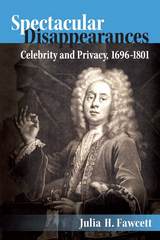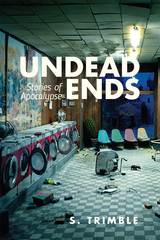2 books about Great Britian

Spectacular Disappearances
Celebrity and Privacy, 1696-1801
Julia H. Fawcett
University of Michigan Press, 2016
How can people in the spotlight control their self-representations when the whole world seems to be watching? The question is familiar, but not new. Julia Fawcett examines the stages, pages, and streets of eighteenth-century London as England's first modern celebrities performed their own strange and spectacular self-representations. They include the enormous wig that actor Colley Cibber donned in his comic role as Lord Foppington--and that later reappeared on the head of Cibber's cross-dressing daughter, Charlotte Charke. They include the black page of Tristram Shandy, a memorial to the parson Yorick (and author Laurence Sterne), a page so full of ink that it cannot be read. And they include the puffs and prologues that David Garrick used to heighten his publicity while protecting his privacy; the epistolary autobiography, modeled on the sentimental novel, of Garrick's protégée George Anne Bellamy; and the elliptical poems and portraits of the poet, actress, and royal courtesan Mary Robinson, a.k.a. Perdita.
Linking all of these representations is a quality that Fawcett terms "over-expression," the unique quality that allows celebrities to meet their spectators' demands for disclosure without giving themselves away. Like a spotlight so brilliant it is blinding, these exaggerated but illegible self-representations suggest a new way of understanding some of the key aspects of celebrity culture, both in the eighteenth century and today. They also challenge divides between theatrical character and novelistic character in eighteenth-century studies, or between performance studies and literary studies today. The book provides an indispensable history for scholars and students in celebrity studies, performance studies, and autobiography—and for anyone curious about the origins of the eighteenth-century self.
[more]

Undead Ends
Stories of Apocalypse
S. Trimble
Rutgers University Press, 2019
Undead Ends is about how we imagine humanness and survival in the aftermath of disaster. This book frames modern British and American apocalypse films as sites of interpretive struggle. It asks what, exactly, is ending? Whose dreams of starting over take center stage, and why? And how do these films, sometimes in spite of themselves, make room to dream of new beginnings that don’t just reboot the world we know? Trimble argues that contemporary apocalypse films aren’t so much envisioning The End of the world as the end of a particular world; not The End of humanness but, rather, the end of Man. Through readings of The Road, I Am Legend, 28 Days Later, 28 Weeks Later, Children of Men, and Beasts of the Southern Wild, this book demonstrates that popular stories of apocalypse can trouble, rather than reproduce, Man’s story of humanness. With some creative re-reading, they can even unfold towards unexpected futures. Mainstream apocalypse films are, in short, an occasion to imagine a world After Man.
[more]
READERS
Browse our collection.
PUBLISHERS
See BiblioVault's publisher services.
STUDENT SERVICES
Files for college accessibility offices.
UChicago Accessibility Resources
home | accessibility | search | about | contact us
BiblioVault ® 2001 - 2024
The University of Chicago Press









